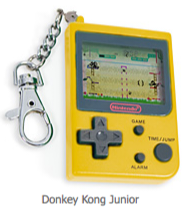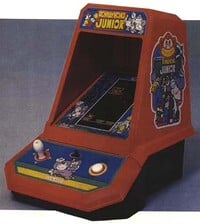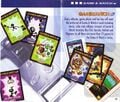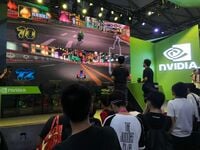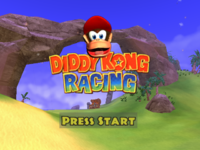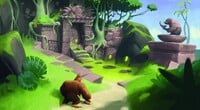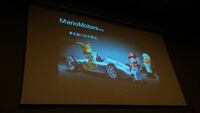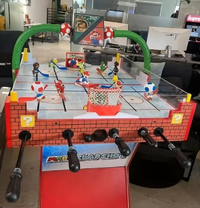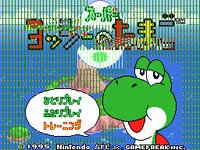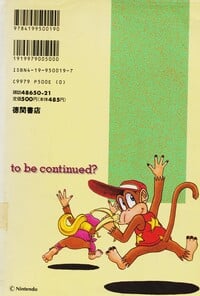List of unreleased media
- Not to be confused with tech demos, which are rarely intended to be turned into commercial products; internal tests, which are created solely for use inside Nintendo; pre-release and unused content, elements from a game that are removed or altered before release; or proposed media, products that were proposed either to or by Nintendo with the intention of releasing but were canceled before very much official development could occur.
Due to various reasons (ranging from being of poor quality, developing a game for a failed or soon-to-be-discontinued system, or the company facing financial or legal woes), a project can end up being canceled and cease production. Despite their status, concepts present in canceled games and other media can be reused in commercial releases, and some canceled games are repurposed into different projects.
A game in development can also end up becoming vaporware, a term for projects that are announced and for which development is started, but for similar reasons, were never published.
The following is a list of media of the Super Mario franchise that has been canceled, or was never produced or released.
Canceled games and vaporware[edit]
| # | Game | System | Description and/or reason |
|---|---|---|---|
| 1 | Donkey Kong no Ongaku Asobi | Family Computer | A music-based spin-off of Donkey Kong, canceled mainly due to copyright issues with the featured songs. |
| 2 | Mario Takes America | Philips CD-i | A Super Mario platformer, canceled due to financial issues caused by Philips being unsatisfied with the development's progress. Attempts to rework the title into a Sonic the Hedgehog game and even later with original characters fell through, with developer Cigam going bankrupt in 1994.[1] |
| 3 | Super Mario's Wacky Worlds | Philips CD-i | A successor to Super Mario World, canceled due to the failure of the CD-i.[2] Three official prototype discs are in circulation. |
| 4 | VB Mario Land | Virtual Boy | A sequel to Super Mario Land 2: 6 Golden Coins, otherwise known as Mario Adventure; scrapped in favor of Mario Clash, based on the Mario Bros.-esque mini-game but with extensive variety.[3] |
| 5 | Mario Artist series | 64DD | A follow-up to Mario Paint, originally called Mario Paint 64 and Mario Paint 3D. It allowed for many processes while playing, and used a controller different from the original SNES Mouse. Only Paint Studio, Talent Studio, Communication Kit and Polygon Studio were released; an additional game, Sound Studio, was canceled.[4] A different iteration of Paint Studio was in development by Software Creations, but it was canceled due to internal politics between Nintendo of America and Nintendo's headquarters in Japan over control of the project.[5] Additionally, Paint Studio was originally going to feature a Gnat Attack game mode, but it was later removed, likely due to it negatively affecting the mouse settings for the main painting mode. According to Shigeru Miyamoto, Mario's face on the title screen of Super Mario 64 actually originated from a prototype of Paint Studio. |
| 6 | Super Mario 64 2 | 64DD | A sequel to Super Mario 64, abandoned due to a lack of progress and the 64DD's late release and commercial failure. Certain aspects were carried over to Super Mario Sunshine and Super Mario 64 DS. It may be related to Super Mario 64 Disk Version, a similarly-unreleased working port of the previous game demonstrated at Nintendo Space World 1996.[6] |
| 7 | Super Mario RPG 2 | 64DD | A sequel to Super Mario RPG: Legend of the Seven Stars, otherwise known as Mario RPG 2[7] and Mario RPG 64[8] while in development. Due to complications involving Square, it was reworked into Paper Mario and was released as a standard Nintendo 64 title. |
| 8 | Diddy Kong Pilot | Game Boy Advance | A follow-up to Diddy Kong Racing, featuring planes as the only vehicle. The first iteration was shown at E3 2001 and planned for March 4, 2002,[9] but it was unpublished by the time Rare was bought by Microsoft in 2002. The second iteration in 2003 was reworked into Banjo-Pilot and published by THQ, released for the Game Boy Advance.[10] |
| 9 | Donkey Kong Coconut Crackers | Game Boy Advance | A puzzle game starring Donkey Kong that was planned for December 7, 2001[11] before being unpublished before Microsoft purchased Rare. It was reworked into It's Mr. Pants and published by THQ, also released for Game Boy Advance.[12] |
| 10 | Donkey Kong Plus | Game Boy Advance / Nintendo GameCube | A remake of the Game Boy version of Donkey Kong, presumably canned in favor of Mario vs. Donkey Kong, an original game based on the classic Donkey Kong gameplay. Although the game was shown at E3 2002 as a proof-of-concept for connectivity between Game Boy Advance and Nintendo GameCube systems, its intended system is unclear.[13] |
| 11 | Donkey Kong Racing | Nintendo GameCube | Another follow-up to Diddy Kong Racing that was unfinished before Rare was bought by Microsoft. Following its cancelation in favor of Star Fox Adventures, it was being reworked into Sabreman Stampede for the Xbox 360, but this iteration of the title was canceled due to a lack of focus and Rare's unfamiliarity with the hardware; however, a Donkey Kong-themed racing game, Donkey Kong: Barrel Blast, would eventually be released for the Wii in 2007.[14] |
| 12 | Yoshi Touch & Go | Nintendo GameCube | Was later reworked into a Nintendo DS title with the same name. |
| 13 | DK Bongo Blast | Nintendo GameCube | A Donkey Kong racing game that would have used the DK Bongos. Was reworked for the Wii as Donkey Kong: Barrel Blast, replacing the bongo controls with motion controls.[15] |
| 14 | Super Paper Mario | Nintendo GameCube | At one point, the game was considered for a 2006 release on both the Nintendo GameCube and the Wii,[16] but it was ultimately pushed back to 2007 exclusively for the Wii.[17] |
| 15 | Super Mario Spikers | Wii | A volleyball-wrestling hybrid game that was being developed by Next Level Games before being canceled in favor of Punch-Out!! due to aspects of the game clashing with Nintendo's code of honor.[18] |
| 16 | Mario Kart World | Nintendo Switch | The game was originally in development for the Nintendo Switch, but it was later reworked as a Nintendo Switch 2 title.[19] |
| 17 | Donkey Kong Bananza | Nintendo Switch | The game was originally in development for the Nintendo Switch, but it was later reworked as a Nintendo Switch 2 title.[20] |
Unreleased ports[edit]
These games were planned ports of already existing Super Mario titles to different consoles, which went unreleased for various reasons.
Donkey Kong 3 for Mini Classics[edit]
A Mini Classics version of Donkey Kong 3 was planned but never released. In a stock image, it is mislabeled as Donkey Kong Junior. The original game has a two-player mode, which would have been impossible on the Mini Classics.
Donkey Kong 3: Dai Gyakushū for FM-7[edit]
Throughout 1984, Hudson Soft advertised that Donkey Kong 3: Dai Gyakushū would be released on the FM-7 as well as the other Japanese PCs it was ultimately released on.[21] However, this version was never released and ads in 1985 omit mention of the game.
Donkey Kong Jr. Coleco Tabletop (early version)[edit]
The tabletop arcade version of Donkey Kong Jr. by Coleco, released in 1983, was a rebranded version of the Game & Watch Tabletop version. However, early promotional images show a machine more in line with Coleco's other tabletops, with a completely different port than the released model (which looks closer to the original arcade game). A mock-up machine has been found, but it contained the original Donkey Kong inside.[22]
Donkey Kong Jr. for BBC Micro[edit]
Donkey Kong Jr. is an unreleased port of the arcade game of the same name for the BBC Micro. British developer Adrian Stephens was commissioned to write the version by Atari, Inc. under the Atarisoft brand, after he had worked on Killer Gorilla, a clone of the original Donkey Kong. Stephens cited this as the moment he became "legit."[23] The port was finished in 1984, but went unreleased.[24]
Enhanced Donkey Kong and Donkey Kong Jr. ColecoVision ports[edit]
In the early 2000s, incomplete prototype versions of Donkey Kong and Donkey Kong Jr. for ColecoVision were discovered. Both cartridges actually postdated the ColecoVision releases and were seemingly ports of the versions from the Coleco Adam computer, which featured more levels and cutscenes. The games were re-compiled into hacked ROMs titled "Super DK!" and "Super DK Junior" respectively; the unaltered ROMs were never released.[25][26]
Famicom Mini Collection[edit]
- Main article: Famicom Mini Collection
A multicart of Family Computer games ported to the Game Boy Advance, planned to be released in China by iQue. It featured Mario Bros., Super Mario Bros., Wrecking Crew, Dr. Mario, Donkey Kong, and Super Mario Bros. 2 (Japan), in addition to Clu Clu Land, Ballon Fight,[sic] Metroid, Excite Bike, and Ice Climber.
Game & Watch-e[edit]
As early as the North American launch of the e-Reader, Nintendo had unveiled plans to release a series of Game & Watch cards for the e-Reader device. However, the only card ever released was a promotional card for Manhole (bundled in with the e-Reader itself), with the full set never being produced. The card packs, officially titled Game & Watch-e or Game & Watch-e Collection, were to feature three versions of games: classic, color, and collector. The classic versions were the original games, while the color versions were similar to the "Modern" modes in the Game & Watch Gallery series (featuring the Super Mario characters). The exact details of the collector versions remain unknown, though the card packaging artwork showcases it with a black-and-white Luigi.
The game ports appear to be unique from Game & Watch Gallery 4; a few advertisements show a screenshot of the color version of Fire, which has a more basic background (e.g. the grass and sky) compared to the Modern Gallery 4 version. Additionally, a few advertised games did not receive other Game Boy Advance ports at all; namely, Spitball Sparky and the color version of Vermin (featuring Yoshi).[27]
In an August 2003 brochure from Walmart, it was stated that the cards were planned to launch in October of that year. The short release window implies that the Game & Watch-e line was effectively completed before it was abruptly canceled.[27] Its cancelation was most likely due to the failure of the e-Reader on the North American market, though no official reasoning is known.
- Gallery
Mario Bros. Apple II port[edit]
Mario Bros. was ported to the Apple II in 1984 by Atari, but was never officially released. Despite this, its code was leaked (possibly by an actual Atari employee) and was widely distributed in the 1980s via piracy.[28][dead link] There was even a bootleg Russian arcade version of Mario Bros. based on the Apple II prototype known as Kuzmich-Egorych (Кузьмич-Егорыч).[29]
Mario Bros. Atari 8-bit port (1984 version)[edit]
In 1984, Atari planned to release Mario Bros. for their Atari 8-bit computer line (400/800/XL/XE). This port was identical to the previously released Atari 5200 version of the game. For unknown reasons, the game was canceled despite being fully finished. Mario Bros. would eventually receive an Atari 8-bit release in 1988, but this port was completely different than the 1984 prototype.[30]
Mario Bros. Commodore 64 port (1984 version)[edit]
Yet another Mario Bros. port that went unreleased was the Commodore 64 version, once again planned for a 1984 release. This version was to have been published by Atari, but was developed by two programmers from Designer Software.[31][32] A completely different port for the Commodore 64 would later be released by Ocean in 1987.[33]
Mario Kart Wii for Nvidia Shield[edit]
Mario Kart Wii was one among several Wii games that were ported to the Nvidia Shield in China. Announced during ChinaJoy 2018,[34] the port was playable at the event, with a competition being held in the game's Time Trial mode.[35] It would have featured online multiplayer, which is no longer available on the original game due to the discontinuation of the Nintendo Wi-Fi Connection.[36] It is the only Wii game on the Nvidia Shield that was never released despite being fully finished, as the developers stopped receiving responses from the Chinese government during the approval process.[37] All Wii game ports on the Nvidia Shield were later delisted in 2021 and made unplayable in 2022, with the verification server shutting down due to the system's discontinuation in China.[38][39][40]
Mario Party and Mario Party 2 for 64DD[edit]
The first two Mario Party games were among many announced titles for the 64DD,[citation needed] but the peripheral was a commercial failure. This resulted in all Super Mario games for the system being canceled, except for four Mario Artist games.
Other Atarisoft computer ports[edit]
In several magazine publications, an advertisement from Atari was run stating that Mario Bros. and Donkey Kong Jr. would release for the Commodore 64, IBM PC (DOS), and Apple II. None of these ports were ever released, but as aforementioned, the Apple II and Commodore 64 versions of Mario Bros. have been found. The flyer also lists several never-released ports of Crystal Castles, Typo Attack, and Track & Field.[41]
According to The Atarisoft FAQ, the following ports were also planned:
- Donkey Kong for the BBC Micro and IBM PCjr.
- Donkey Kong Jr. for the Commodore VIC-20, ZX Spectrum, DOS, Apple II and Commodore 64
- Mario Bros. for the Commodore VIC-20 and DOS
Several of these have also been confirmed by other sources.[42][43]
Pinball for Japanese home computers[edit]
In 1985, Hudson Soft planned to release Pinball for various Japanese home computers much like other Famicom and NES games, but the project was canceled for unknown reasons.[44]
Super Game Module Donkey Kong games[edit]
The Super Game Module was a canceled peripheral for the ColecoVision, which took unique cartridges. Among its planned games were Super Donkey Kong and Super Donkey Kong Junior; these may be related to the "enhanced" Donkey Kong and Donkey Kong Jr. ColecoVision ports seen above.[45]
Super Mario 64: Disk Ban[edit]
Super Mario 64: Disk Ban (スーパーマリオ64 ディスク版, lit. "Super Mario 64: Disk Version"), known as Super Mario Disk Version in the title screen, is a port of Super Mario 64 for the 64DD that was only officially shown publicly at Nintendo's Shoshinkai 1996 trade show to showcase the system's performance.[46] It was dumped in 2014.[47] The main differences in the port compared to the original game are a title screen replacing Mario's face, an updated sound engine, and longer loading times. The port also contains a bug where the game crashes when entering Wiggler's Basement in Tiny-Huge Island.[48]
Super Mario Bros. 3 id Software pitch[edit]
In 1990, in its infancy, video game company id Software developed a demo for the IBM PC titled Dangerous Dave in Copyright Infringement, which was a playable recreation of World 1-1 with Mario's sprite being replaced with that of the titular character.[49] Dangerous Dave was notable for featuring smooth scrolling,[50] something unheard for PC games of the time. It was then decided to rework the project into a demo for an actual port of Super Mario Bros. 3 for PC, which the developers sent to Nintendo[51] with the intent being to gain authorization to make an official port. The demo reached Nintendo Co., Ltd. management (including Shigeru Miyamoto), who were impressed by the port's quality. However, Nintendo declined to greenlight an official PC version of the game as the company had no plan to release its products outside their own platform.[51]
With a distribution deal with Scott Miller of Apogee Software, Ltd., "Copyright Infringement" id developers John Romero and John Carmack along with Tom Hall later used the engine they had developed to create the Commander Keen series, a series of shareware platform games for MS-DOS.[52], starting with Commander Keen in Invasion of the Vorticons, which was released on December 14, 1990.[53][54]
On December 14, 2015, John Romero uploaded gameplay footage of the port on the video-sharing website Vimeo.[55]
In July 2021, a copy of the id Software pitch was donated to the Strong National Museum of Play, and is currently held in the museum's archives.[56]
- Sprites
Wario Land for NES[edit]
In the November 1993 Nintendo Power "Official Game Pak Directory", Wario Land is listed as an upcoming NES game (while also being listed for Game Boy); this may have been done in error, however.[57]
Yoshi's Cookie on Wii U Virtual Console[edit]
Yoshi's Cookie was originally slated for release on the Wii U Virtual Console, but was ultimately never released.[58] Its cancellation was likely due to a copyright issue (either with Biox or Bullet-Proof Software), which is further evidenced by the Wii Virtual Console version being delisted from the Wii Shop Channel around the same time.
Low-information media[edit]
This section lists canceled projects, most of which have too little information to warrant their own pages.
Games[edit]
64DD Mario no Photopi disk[edit]
A dedicated 64DD disk for storing images edited with Mario no Photopi was announced alongside the game in a press release on December 1997, but it was ultimately never released.[59]
CD-i Donkey Kong game[edit]
A Donkey Kong game was in development for the Philips CD-i. The game was revealed in the LinkedIn resume of programmer Adrian Jackson-Jones, which states that it was in development during the 1992-1993 period at Riedel Software Productions. Jackson-Jones "designed and implemented the game engine" for the project;[60] Jackson claims he worked on the game alongside programmer Owen Flatley and that he has no surviving assets left of the game. These claims were corroborated in an investigation by Time Extension writer John Szczepaniak, who contacted both Jackson-Jones and Riedel Software Productions founder Michael J. Riedel. Riedel stated that the company had a habit of junking canceled projects' assets, while Jackson-Jones was able to confirm his involvement in spite of a memory disorder, stating that he still recalled the experience of programming the game. According to Jackson-Jones, a prominent challenge during development was the limited memory of the CD-i, which he overcame by only loading in on-screen elements based on the player's movement.[61]
According to a Riedel Software Productions artist, the game would have been a branching side-scroller similarly to Donkey Kong Country. However, due to the limitations of the CD-i and issues with Philips, development did not progress past the storyboarding phase.[4]
Diddy Kong Racing Adventure[edit]
- Main article: Diddy Kong Racing Adventure
Diddy Kong Racing Adventure was a pitched sequel to Diddy Kong Racing being developed by Climax. It was never announced to the public in any capacity and only became known after an amateur video game archivist acquired the prototype and published a video about it in November 2016.[62]
D.K.R. DMG[edit]
In an internal Rare document of games that were to be shown at E3 1998, one listing is for D.K.R. DMG, with D.K.R. likely standing for Diddy Kong Racing and DMG referring to the Game Boy.[63] The game was never publicly shown.
Donkey Kong IV[edit]
Donkey Kong IV is a rumored final title in the original Donkey Kong series. The game is stated to have only been test-marketed in arcades, never getting a full release. It was only ever reported in issue #13 of Mean Machines magazine (October 1991), and was possibly the result of a misconception or confusion for another game (a likely candidate being Ocean's Kong Strikes Back!).[64]
Donkey Kong Country 4[edit]
According to Rare employee Paul Rahme, it was internally suggested at Rare to make a new Donkey Kong Country game for the Nintendo DS, tentatively named Donkey Kong Country 4, as remaking the trilogy for the Game Boy Advance gave the developers experience and a good basis for making a sequel. The pitch ended up not getting much traction internally and was dropped.[65][66]
Freedom[edit]
After the release of Skylanders: SuperChargers in 2015, Vicarious Visions started development on a pitch for a Nintendo Switch game directed by founders Guha and Karthik Bala.[67] The pitch, codenamed Freedom, was a prototype for a Donkey Kong platformer set in an open island and focused on movement and flow featuring wall climbing and vine swinging, as well as a new grinding mechanic on sloped vines using banana peels inspired by the studio's past work on the Tony Hawk's series and Jet Grind Radio for the Game Boy Advance.[67]
Freedom would have featured a very different art style compared to past Donkey Kong games and Skylanders: SuperChargers, where Donkey Kong would have had "Burton-esque" exaggerated proportions with big arms and small legs. Another planned setting for the Freedom prototype was a jungle-infested city, in which Donkey Kong would have had to climb up to upper areas by interacting with objects and building up momentum.[67]
Despite receiving interest from Nintendo, Vicarious Visions' parent company Activision canceled the game in spring 2016 to receive additional development for their major franchises.[67] The game's cancelation would be one of the reasons for the Bala brothers' departure from the company and founding of Velan Studios,[67] which would later collaborate with Nintendo to develop Mario Kart Live: Home Circuit.
Good-Feel's second Wario game[edit]
In an interview with Takahiro Harada from the November 2008 issue of the German magazine N-Zone, it was mentioned that Good-Feel was working on a concept for another Wario game after Wario Land: Shake It! for the Wii or the Nintendo DS.[68] Details on the concept are unknown.
Mario Motors[edit]
Mario Motors was a pitch made by game designer Yoot Saito for a Nintendo DS game. The game had players "shaving and sculpting out of a chunk of metal to make a cylinder [which then] decides the ability of your engines.". Saito also considered having the player blow in the DS's microphone to "learn how acceleration works" but scrapped it because the mechanic could have been too demanding for children. Despite initial interest from both Satoru Iwata and Shigeru Miyamoto, the project never got off the ground with Saito stating, "I can’t tell you why, but please guess."[69]
Mario Slapshot[edit]
In 2024, images of an arcade table game named Mario Slapshot were leaked online. It is a hockey-themed, foosball-like game with a Super Mario theme, featuring molded figures of Super Mario characters as the players, and a scoreboard mounted by two Piranha Plants. The machine was developed by ThinkUp for publishing by Arcade1UP.[70] It is unknown if this was a rejected pitch or if the licensing was already secured.
Mario's Castle[edit]
Mario's Castle was a game announced for the canceled "Project Atlantis" portable system. The only known report of it was in an issue of the gaming magazine Electronic Gaming Monthly.[71]
Mario's Mission Earth[edit]
Mario's Mission Earth, also known as Mario's Planet Quest,[72] was a canceled SNES edutainment game from The Software Toolworks, which would have likely been similar to Mario is Missing! and Mario's Time Machine. The only evidence of the game's existence is a brief mention on composer Mark Knight (who also worked on the SNES port of Mario's Time Machine) list of works on his personal webpage,[73] which was later reiterated on a post for a 2017 Kickstarter campaign.[74] It is unclear how far the game got into development.
Return of Donkey Kong[edit]
Return of Donkey Kong was a canceled Nintendo Entertainment System game that was mentioned in publications from 1987 and 1988.
It was first featured as an upcoming game in the Official Nintendo Player's Guide in 1987[75] and the fifth issue (Feb/March 1988) of Nintendo Fun Club.[76] Not much is known about the title aside from the fact that it was considered a follow-up to Donkey Kong, Donkey Kong Jr., Donkey Kong Jr. Math, and Donkey Kong 3.[76] The two blurbs describing the game suggest that barrel-throwing would return as a mechanic, and that Donkey Kong would appear as a playable character.[75][76] The last known mention of the game was in the May 1988 issue of Computer Entertainer where Nintendo announced that the game would not be released that year. In addition, several NES games would be discontinued including Donkey Kong and Donkey Kong Jr. but the two games would be combined onto one cartridge and re-released under the title Donkey Kong Classics.[77]
According to a Nintendo sales kit, the product code for Return of Donkey Kong is NES-RD.[78][better source needed] No images or video were ever shown of the game.
Super Donkey[edit]
Super Donkey was a Donkey Kong game for the Super Famicom and Super Nintendo Entertainment System. In July 2020, a large amount of Nintendo-related source code and prototypes were leaked to the public. Among this leak was the source code to Super Mario World 2: Yoshi's Island, which included many prototypes that were greatly different from the final product. However, two files are so early that they have virtually no connection to the game at all - "super_donkey_1" and "super_donkey_2". These games presumably served as the basis of what became Yoshi's Island, though most elements of Super Donkey were eventually scrapped.[79] Among the recognizable elements are Melon Bugs, apes that may be an early version of Grinders, and a dog enemy that may have been the inspiration for Poochy.[80]
At first glance, the game itself features a generic protagonist and no connection to Mario. However, various graphic scratchpads (scattered across other files) confirm that at some point, the game starred Mario, with Donkey Kong appearing as well. This strongly implies that the game was originally a Donkey Kong title, which was never formally announced or shown to the public.
Super Mario American football game[edit]
During the early years of Retro Studios, plans were underway for an American football game featuring Mario for the GameCube. At the request of Nintendo, the project was reworked early on to turn it into a generic, realistic football game (known as both NFL Retro Football and Retro Studios Football). Its Mario-less incarnation was ultimately canceled as well, reportedly due to the release of Madden NFL 2002 on the GameCube.[81][82]
Super Yoshi no Tamago[edit]
In October 2024, a large amount of assets and source code from Game Freak were leaked to the public.[83] Specifically, the leaked source code to Pokémon Black Version and Pokémon White Version includes an unreleased and unfinished build for a Yoshi sequel or remake titled Super Yoshi no Tamago (スーパーヨッシーのたまご, lit. "Super Yoshi's Egg").[84][85] According to the commit notes, the build was included as a test for the multiboot functions of Pokémon Black Version and Pokémon White Version's engine in 2007.[84] The game's title and copyright year (listed as 1995 on the title screen) suggest that it was originally developed for the Super Famicom.[85]
VB Mario Kart[edit]
The German magazine Big N claimed that a Virtual Boy installment of the Mario Kart series, tentatively named VB Mario Kart, was in development.[86] The only known media report of it is Big N's August 2000 issue, which listed it among various other canceled Virtual Boy projects. As such, VB Mario Kart ended up being canceled due to the discontinuation of the Virtual Boy for its poor sales.
Yoshi version of Kirby Tilt 'n' Tumble[edit]
In an interview regarding the development of Kirby Tilt 'n' Tumble, a developer on the game stated that the team had experimented with various main characters before settling on Kirby, including a version of the game starring Yoshi.[87]
Films[edit]
DIC Entertainment Super Mario film[edit]
An animated Super Mario film was reportedly in production at DIC Entertainment in 1989 with a planned summer 1990 release.[88] No other information about the movie is known.
Sony Pictures Super Mario film[edit]
Internal emails leaked to the public by proxy of the 2014 Sony Pictures hack detailed negotiations between Avi Arad and Nintendo to have Sony Pictures produce a Super Mario movie. The email exchange between Avi Arad and Sony Pictures executive Amy Pascal showed photos of Arad meeting with Shigeru Miyamoto and Satoru Iwata; Pascal would later forward one of the emails to another executive with the comment "Avi closed Mario brothers" (Arad would later state to the press the deal had in fact not been closed after the emails were made public by the hack).[89] Although no information beyond what is found in the leaked emails was made public, it seems the talks for Super Mario broke down, as Nintendo would officially announce in 2018 that a Super Mario film would be produced by Illumination, an animation company owned by Sony Pictures' rival Universal Pictures best known for the Despicable Me franchise. However, it was eventually announced on November 7, 2023 that Nintendo would collaborate with Avi Arad and Sony Pictures on adapting The Legend of Zelda as a live-action film, indicating that neither party dropped the idea of collaborating entirely.[90]
Miscellaneous[edit]
Fourth volume of Super Mario Bros. 2 (manga)[edit]
Most of the chapters of the Super Mario Bros. 2 manga were collected reprinted in three volumes. A fourth volume was planned to release featuring the final chapters, but was canceled due to Wanpakku Comic ceasing publication.
Super Mario Bros. Christmas Show[edit]
Among the trademarks present in the document "Action man & 67 other titles; musical compositions." filed by DIC Entertainment and EMI Music Publishing is one for the Super Mario Bros. Christmas Show.[91] Additionally, the document "SMC 60 second theme; musical compositions." filed by Andy Heyward and his wife contains a trademark for the Super Maria[sic] Bros. Christmas Show.[92]
Second volume of Super Donkey Kong (Manga Boys Comics Special)[edit]
There were plans to produce a second volume of Super Donkey Kong that would adapt Donkey Kong Country 2: Diddy's Kong Quest, as indicated on the dust jacket and back cover of the volume. However, author Anna Kouya never continued with the story.[93][94]
Other unreleased media[edit]
Italian dub of the Donkey Kong Country television series[edit]
An Italian dub of the Donkey Kong Country television series was created by Studio P.V. to be aired by Mediaset, though it was never published.[95]
Rumble Pak-compatible version of Mario Kart 64[edit]
According to Nintendo's head of PR and marketing Yoshio Hongo in the October 1997 issue of The 64 DREAM, a version of Mario Kart 64 compatible with the Rumble Pak was created internally at Nintendo. Hongo stated that he did not know whether it would be released, as Mario Kart 64 was the best-selling Nintendo 64 game at the time and it was unclear if it would have been a good idea to rerelease the game.[96]
References[edit]
- ^ monokoma (September 15, 2014). The Cancelled Mario Game that was Taken Away by a Bank in Canada. Unseen64. Retrieved May 18, 2015.
- ^ Super Mario's Wacky Worlds. Sidewalk CD-i Playground. Archived March 14, 2016, 13:06:49 UTC from the original via Wayback Machine. Retrieved June 19, 2008.
- ^ January 2010. Official Nintendo Magazine #051 (JPG). Future plc. Page 62.
- ^ a b DidYouKnowGaming (May 12, 2024). Rumored Mario Games SOLVED. YouTube. Retrieved May 12, 2024.
- ^ monokoma (April 4, 2008). Creator / Mario Artist [64DD – Beta / Canceled]. Unseen64. Retrieved May 18, 2015.
- ^ Jimmy130 (June 14, 2014). Photos 64DD : Super Mario 64 Disk Version. Gamekult (French). (Archived June 28, 2014 via Wayback Machine.)
- ^ IGN Staff (July 29, 1997). Miyamoto Reveals Secrets: Fire Emblem, Mario Paint 64. IGN. Retrieved May 18, 2015.
- ^ Paper Mario: Sticker Star: "Going All Out with Stickers". Iwata Asks.
- ^ Metts, Jonathan (October 9, 2001). Nintendo's New Release Dates. Nintendo World Report.
- ^ U64 Staff & Contributors (April 7, 2008). Diddy Kong Pilot [GBA – Beta / Canceled]. Unseen64. Retrieved May 18, 2015.
- ^ October 2001. Game Boy Xtreme #4. Thin Ice Media. Page 10.
- ^ U64 Staff & Contributors (April 7, 2008). Donkey Kong Coconut Crackers [GBA – Canceled] (It’s Mr. Pants [GBA – Beta]). Unseen64. Retrieved May 18, 2015.
- ^ U64 Staff & Contributors (April 8, 2008). Donkey Kong Plus [GBA – Canceled]. Unseen64. Retrieved May 18, 2015.
- ^ U64 Staff & Contributors (April 8, 2008). Donkey Kong Racing [GameCube – Canceled]. Unseen64. Retrieved May 18, 2015.
- ^ U64 Staff & Contributors (April 9, 2008). Donkey Kong Bongo Blast [GC – Unreleased]. Unseen64. Retrieved May 18, 2015.
- ^ January 5, 2007. Wii Preview: Super Paper Mario. NGamer Magazine. Retrieved July 17, 2016. (Archived December 9, 2009 via Wayback Machine.)
- ^ U64 Staff & Contributors (April 9, 2008). Super Paper Mario [GC – Canceled]. Unseen64. Retrieved May 18, 2015.
- ^ Robertson, Liam (August 6, 2011). Super Mario Spikers [Wii – Canceled]. Unseen64. Retrieved May 18, 2015.
- ^ May 21, 2025. Ask the Developer Vol. 18: Mario Kart World — Part 2. Nintendo. Retrieved May 21, 2025. (Archived May 21, 2025, 13:34:33 UTC via Wayback Machine.)
- ^ July 15, 2025. Ask the Developer Vol. 19: Donkey Kong Bananza — Part 2. Nintendo. Retrieved July 18, 2025.
- ^ https://fm-7.com/museum/products/ma52bkgp. Oh!FM-7 (Japanese). Retrieved May 27, 2024.
- ^ Donkey Kong Jr Coleco Tabletop Arcade - Model 2398X. Geek Vintage. Archived January 23, 2010, 19:21:55 UTC from the original via Wayback Machine. Retrieved May 27, 2024.
- ^ May 12, 2024. Interview With Adrian Stephens. The BBC Games Archive. Retrieved August 12, 2025.
- ^ Highretrogamelord (March 8, 2018). https://www.youtube.com/watch?v=DNKgk68RirA. YouTube (English). Retrieved May 27, 2024.
- ^ Super Donkey Kong. Digital Press Online (English). Retrieved May 27, 2024.
- ^ December 20, 2013. Super Donkey Kong - ColecoVision / Adam. AtariAge Forums (English). Retrieved May 27, 2024.
- ^ a b UncleBob (December 2, 2010). "Game and Watch-e: What was meant to be". Nintendo World Report (English). Retrieved May 27, 2024.
- ^ https://twitter.com/forestillusion/status/1005351467085991936
- ^ Kuzmich-Egorych - MAME machine. Arcade Italia. Retrieved May 27, 2024.
- ^ Mario Bros.. AtariProtos.com. Archived February 10, 2006, 03:42:17 UTC from the original via Wayback Machine. Retrieved May 27, 2024.
- ^ Atarisoft Mario Bros for Commodore 64. games.greggman.com (English). Retrieved May 27, 2024.
- ^ "...my friend Gregg Tavares and I created (from scratch) for the Commodore 64 for Atarisoft (indirectly through a company called Designer Software)" – August 23, 2008. Mario Bros - Commodore 64 (comments section). YouTube. Retrieved May 27, 2024.
- ^ April 20, 2018. [Longplay] Mario Bros, phase 1-10 (Ocean) - Commodore 64. YouTube. Retrieved May 27, 2024.
- ^ 英伟达SHIELD (August 3, 2018). https://weibo.com/6154885380/GsVVdcTql. Weibo (Simplified Chinese). Retrieved May 27, 2024. (Archived November 14, 2022, 17:37:50 UTC via Wayback Machine.)
- ^ @chinesenintendo (August 3, 2023). https://x.com/chinesenintendo/status/1025414448834478081. X (English). Retrieved May 27, 2024.
- ^ 英伟达SHIELD (August 3, 2018). ChinaJoy |《马力欧卡丁车Wii》抢先玩,SHIELD爆发全游戏掌控力. WeChat (Simplified Chinese). Retrieved May 27, 2024.
- ^ DidYouKnowGaming? (December 5, 2020). Mario Kart Wii - Did You Know Gaming? Ft. Remix. YouTube. Retrieved May 27, 2024.
- ^ Doolan, Liam (August 1, 2021). Nvidia Shield Shutting Down Nintendo Wii Game Downloads In China. Nintendo Life (English). Retrieved May 27, 2024.
- ^ @chinesenintendo (April 6, 2022). It has been discovered that the online verification server for Nvidia Shield games have been down. Earliest reports of server down were on Feb 7th, 2022, and refund channels have been opened as of March 28th, 2022.. X. Retrieved May 27, 2024.
- ^ @chinesenintendo (May 13, 2022). The official China model of Nvidia Shield will no longer offer system update and Game Stream services. The hardware itself has already been discontinued by the end of 2019.. X. Retrieved May 27, 2024.
- ^ Atarisoft ad. OLD VIDEO GAME ADVERTISEMENTS. Retrieved May 27, 2024.
- ^ "That Just leaves Donkey Kong Jr. swinging onto the Spectrum 48K at €14.99." – July 1984. Big-K-Magazine Issue 04. IPC Magazines Ltd. (British English). Retrieved May 27, 2024.
- ^ August 22, 2014. Donkey Kong. Guv1.com (English). Retrieved May 27, 2024.
- ^ June 1985. micomBASIC Magazine. Dempa Publications' Inc. (Japanese).
- ^ Unreleased Hardware / Prototypes. Colecoboxart.com (English). Retrieved May 27, 2024.
- ^ OKeijiDragon (November 7, 2010). Nintendo SpaceWorld '96 | Miyamoto Interview + Super Mario 64DD + Rumble Pak Unveiled. YouTube. Retrieved January 22, 2023.
- ^ Kim, Byungsuk (June 24, 2014). Super Mario 64DD Version Discovered in Japan. Gaming After Hours (English). Retrieved May 27, 2024.
- ^ adonfjv (June 24, 2014). Super Mario 64 Disk Version - 64DD - Boot + 2 bugs. YouTube. Retrieved January 22, 2023.
- ^ CuteFloor (January 12, 2008). Dangerous Dave In Copyright Infringement ⭐ Unreleased Prototype. YouTube. Retrieved May 27, 2024.
- ^ "It looked just like the console version - smooth scrolling and everything." – Kushner, David. Masters of Doom: How Two Guys Created an Empire and Transformed Pop Culture (Hardback). English. ISBN 0-375-50524-5. Page 52.
- ^ a b Dangerous Dave in "Copyright Infringement". rome.ro. Archived January 28, 2008, 16:24:21 UTC from the original via Wayback Machine. Retrieved July 5, 2013.
- ^ "Scott was more than ready to make a deal. The gamers said they would use this new technology to create a title specifically for Apogee to release as shareware." – Kushner, David. Masters of Doom: How Two Guys Created an Empire and Transformed Pop Culture (Hardback). English. ISBN 0-375-50524-5. Page 52.
- ^ Frank, Allegra (December 14, 2015). Doom dev shares rare Super Mario Bros. 3 PC demo (update). Polygon (English). Retrieved May 27, 2024.
- ^ usgamernet (December 14, 2015). Super Mario Bros 3 PC Prototype from id Software. YouTube. Retrieved May 27, 2024.
- ^ Romero, John. Super Mario Bros. 3 Demo (1990). Vimeo. Retrieved May 21, 2024.
- ^ Orland, Kyle (July 13, 2021). Museum obtains rare demo of id Software’s Super Mario Bros. 3 PC port. ArsTechnica (English). Retrieved May 27, 2024.
- ^ Cifaldi, Frank (November 22, 2022). Ahhh I need more of these! Just got a fourth one and am discovering more lost NES games in here. Taz-Mania was just a weird rumor before but here it is, confirmed by Nintendo. Same with Barbie Fashion Designer and We're Back: A Dinosaur Story.. X. Retrieved May 27, 2024.
- ^ Nintendo of America (April 17, 2013). Nintendo eShop - Wii U Virtual Console Sizzle Reel. YouTube. Retrieved May 27, 2024.
- ^ Nintendo Co., Ltd., Fuji Photo Film Co., Ltd., Tokyo Electron Limited (December 2, 1997). 「NINTENDO64」でデジタルカメラ撮影画像を楽しめる製品(商品名:ふぉとぴー)の共同企画・開発についてのお知らせ. nintendo.co.jp (Japanese). Archived February 5, 1998, 08:15:20 UTC from the original via Wayback Machine. Retrieved August 4, 2024.
- ^ December 13, 2010. RSP say they worked on Donkey Kong on CD-i. Interactive Dreams. Archived July 18, 2019, 10:51:26 UTC from the original via Wayback Machine. Retrieved May 27, 2024.
- ^ Szczepaniak, John (July 29, 2023). Like Zelda And Mario, Donkey Kong Was Supposed To Get A Philips CD-i Game - What Happened?. Time Extension. Retrieved May 27, 2024.
- ^ PtoPOnline (November 9, 2016). Diddy Kong Racing Adventure : The Undeveloped Gamecube Racer. YouTube. Retrieved May 27, 2024.
- ^ @ItsMingyJongo (October 22, 2023). Tidying up again & found this for showing #banjokazooie at E3 1998. Fun doodle of box art WIP. We knew what we needed to provide. Just hope @grantkirkhope got the music done in time!. X. Retrieved archive.today/2023.10.25-223712/https://twitter.com/ItsMingyJongo/status/1716047318506451191.
- ^ May 2, 2017. SUPER MARIO BROS. 3: Here's the Oct 1991 Mean Machines review & 4 page history of Mario feature #retrogaming #Nintendo #Mario #NES #gaming. X (English). Retrieved May 27, 2024.
- ^ October 7, 2011. Donkey Kong Country 4: Here Comes [REDACTED PUN]!. DK Vine. Retrieved May 27, 2024.
- ^ Matt, Chad. The Donkey Kong Country GBA Trilogy. DK Vine. Archived December 21, 2011, 07:14:15 UTC from the original via Wayback Machine. Retrieved May 27, 2024.
- ^ a b c d e DidYouKnowGaming (May 4, 2024). Donkey Kong's Lost 3D Platformer & The Decay of Activision Blizzard. YouTube. Retrieved May 4, 2024.
- ^ @mariowiki.com (January 9, 2025). In the November 2008 issue of the German Nintendo magazine N-Zone, it was mentioned that Good-Feel had plans for a 2nd Wario game for both the DS and Wii. Alas, it wasn't meant to be. (find and translation by warelander!). Bluesky. Retrieved February 23, 2026. (Archived January 12, 2026, 11:50:07 UTC via Wayback Machine.)
- ^ Devore, Jordan (April 21, 2018). Yoot Saito worked on Mario Motors, a canceled DS game about building engines. Destructoid. Retrieved May 27, 2024.
- ^ James Hates Everything (June 30, 2024). More Arcade1up Leaks! And We Have the Photos!! (44:27). YouTube. Retrieved February 19, 2025.
- ^ June 1996. Electronic Gaming Monthly Issue 083. Page 18.
- ^ @Borman18 (July 6, 2021). Digging through old documents tonight, lots of references to unreleased games and things I've forgotten about. Alongside someone who worked on Mario's Time Machine was one that I don't recognize for SNES: Mario's Planet Quest. Are we missing another educational Mario game?. X. Retrieved May 27, 2024.
- ^ Mark 'TDK' Knight - Sound Designer and Music Composer for Games, TV and Film.. Mark Knight (English). Archived October 25, 2016, 15:47:07 UTC from the original via Wayback Machine. Retrieved May 30, 2024.
- ^ The Commodore Story - Changing the world 8-bits at a time by WavemStudios » New collaborator - Mark Knight - Games music and soundscape composer. Kickstarter (English). Retrieved May 27, 2024.
- ^ a b "This is your chance to get hold of that barrel-throwing, mischief-making rascal Donkey Kong and take control! Nintendo's best known character is back. And he's up to more tricks and trouble than you can imagine!" "Coming Attractions". Official Nintendo Player's Guide, 1987, p. 159. Scan here. Retrieved March 31, 2025.
- ^ a b c "That barrel-throwing rascal Donkey Kong is some kind of crazy. In Donkey Kong, he has Pauline in his clutches. In Donkey Kong Jr., he gets locked in a cage. In Donkey Kong Jr. Math, he knows the score in a math jungle. In Donkey Kong 3, he makes trouble for Stanley the bugman. And now Donkey Kong is soon to come back with more barrel-tossing fun. But this time you're in control! Are you video buff enough to handle the one-and-only Return of Donkey Kong? Watch for it!" "Sneak Peeks". Nintendo Fun Club News Vol. 5, Feb/March 1988, p. 10. Scan here. Retrieved March 31, 2025.
- ^ Computer Entertainer, May 1988, p. 11. Scan here. Retrieved September 13, 2025.
- ^ Sebastian (July 24, 2020). Super Nintendo Leaked Demos - super_donkey_1.bin. YouTube. Retrieved May 27, 2024.
- ^ Sebastian (July 24, 2020). Super Nintendo Leaked Demos - super_donkey_2.bin. YouTube. Retrieved May 27, 2024.
- ^ DidYouKnowGaming (November 4, 2023). 8 Cancelled Nintendo Games from Retro Studios (New Discoveries). YouTube. Retrieved November 4, 2023.
- ^ Robertson, Liam (April 8, 2008). Retro Studios Football. Unseen64. Retrieved May 27, 2024.
- ^ Welsh, O. (October 14, 2024). Pokémon developer Game Freak suffers massive data leak. Polygon. Retrieved October 14, 2024.
- ^ a b Development:Pokémon Black and White/General Oddities. The Cutting Room Floor. Retrieved October 14, 2024.
- ^ a b Invocation of Sebastian (October 14, 2024). Super Yoshi / Yoshi's Egg DS Remake (UNRELEASED 2007). YouTube. Retrieved October 14, 2024.
- ^ July-August 2000. Big N magazine. German. Page 19.
- ^ Hobonichi' (November 4, 2000). https://www.1101.com/nintendo/nin15/index.htm. 1101.com (JPInterview on Hobonichi's website).
- ^ Puig, C. (April 17, 1989). MOVIES. Los Angeles Times. Retrieved July 9, 2024. (Archived March 1, 2024, 10:14:36 UTC via Wayback Machine.)
- ^ December 11, 2014. Movie Rights From Nintendo, Leaked Emails Show. Buzzfeed. Retrieved May 27, 2024.
- ^ Nintendo Co., Ltd., Arad Productions Inc., Sony Pictures Entertainment Inc. (November 8, 2023). Development of a Live-Action Film of The Legend of Zelda to Start. nintendo.co.jp. Retrieved November 7, 2023. (Archived November 7, 2023, 22:06:15 UTC via Wayback Machine.)
- ^ Action man & 67 other titles; musical compositions. United States Copyright Office. Retrieved May 27, 2024.
- ^ SMC 60 second theme; musical compositions.. United States Copyright Office. Retrieved May 27, 2024.
- ^ Super Donkey Kong (Manga Boys Comics Special) Back cover
- ^ Have a 腐臭 day!.RANDOM HOO HAAS. Retrieved February 22, 2026.
- ^ Ζona Αnimazione (2004). "Donkey Kong Country". Antonio Genna. Retrieved February 27, 2025.
- ^ DidYouKnowGaming (August 30, 2024). NEW Nintendo 64 Game Facts Discovered (N64) (4:00). YouTube. Retrieved February 27, 2025.
